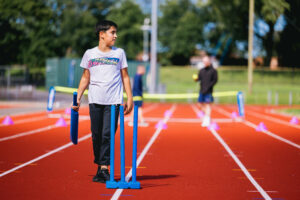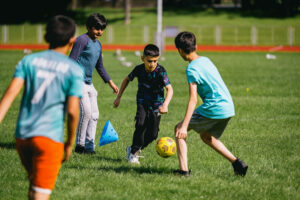As Spirit’s largest investment prepares to wind down, Ruth Hollis looks at the impact and legacy of Activity Alliance’s Get Out Get Active.

An active legacy: Celebrating 7 years of GOGA reaching inactive people

Spirit of 2012 is very proud to have funded GOGA for the last 7 years and to have committed £7.5m to the programme – being the founding funder in Phase 1 and then joined by Sport England and London Marathon Foundation.
Attending the GOGA conference and celebration event is a bittersweet moment for me. As we are a spend-out trust which will close in 2026, we will no longer be able to fund GOGA. However, we are extremely proud of the impact which its programme managers and delivery staff have created for participants with our funding.
It hasn’t always been easy. It’s not easy to reach and engage the least active – if it was we wouldn’t have the health inequalities we’re still seeing and the persistent levels of inactivity particularly for disabled people. It wasn’t easy working during and after the pandemic with some of the communities that faced the worst impact – both in terms of isolation and health outcomes. Regardless, GOGA has made a tangible difference to people’s lives.
Why Spirit funded GOGA

Rightly, sports events often pinpoint more people playing sport as one of their key legacy aims – In London, they promised to get a million more people active. However, the link between people watching elite sport on the international stage and being inspired to become more activity isn’t straight forward – it isn’t a “build it and they will come” scenario.
For many communities, elite sports will make people feel even more disengaged from wanting to be physically active. And lots of inactive people may be excluded, particularly from large scale events, for financial reasons or other access barriers from the event and may not connect with it. After the London 2012 Games, for instance, 750,000 more people took part in sport, but in the 10 years since 2012 there has been no significant reduction in the proportion of the population (28%, around 14.5 million people) who are classed as physically inactive. What events do bring though is more targeted investment in a place and the opportunity to think about doing things differently.
So, in 2015 we started to think about whether we might tie some funding into physical activity on the legacy of Rio. When we spoke to stakeholders, including EFDS as they were then, it became clear that the supply side wasn’t the issue – there were lots of activities out there being funded by the sports councils and others – it was changing the approach so that we could connect inactive people to those activities.
We had a very competitive grant application process which AA (EFDS as then) and their home nation partners and others put a really compelling proposition that the Talk to Me principles, developed to engage disabled people, could be used to engage wider inactive groups.
They presented a model that was rooted in localities and starting with small numbers, working in a sustained and deep way to ensure that people felt a sense of connection and belonging, there was time and space for the social – to make friends – as well as delivering activity, often by stealth. The numbers of beneficiaries they presented were much lower than the other bidders but that actually gave us confidence that they knew the challenges of engaging the least active. And they were awarded the grant – and the rest is history.
What has the impact of GOGA been?

For those of us at Spirit of 2012 the impact of GOGA has been huge. Firstly, it has been a real privilege to work with the team at Activity Alliance, Disability Sport Scotland, Disability Sport Wales and Disability Sport NI and Wavehill – and I think it’s amazing that most of us have been involved with the programme since the very beginning.
We have loved getting out and seeing the brilliant work that has been done across the UK by those working on GOGA, and hearing from the participants. Many of them continue to be active a year or more on from participating in GOGA. But it’s the seemingly small successes that make me proud – the ones that are actually so transformational for the person involved. When I’ve travelled to GOGA locations I’ve heard people tell me about making friends, going on holiday together, feeling valued and appreciated, developing support networks, starting volunteering, taking less medication – as well as getting fitter.
It gives us a model that we often talk to other event hosts about – about not being seduced by the big numbers we often see in bids but working out how the excuse an event gives you can help you design programmes with people at its heart and that can genuinely reach those people that will most benefit from the activity and the associated social connections.
I am very proud that Spirit continued to fund GOGA for an additional 3.5 years and that we were able to flex our funding to support you all during COVID. The longer term funding means that we can confidently say that it works – and huge thanks to Wavehill for being the programme’s evaluators from the start.
We love seeing localities continue to reap the benefits of GOGA in the longer term. My wish is that GOGA could be delivered everywhere there are people that need it – that in all communities – and there are inactive people still in all communities – there are be people that can take the model and make it work for their beneficiaries.
It needs to become a movement for change in how we work with inactive communities. A lot has changed since 2015 – particularly the impact that the pandemic and now the cost of living crisis is having for disabled people and groups that we know are more likely to face significant barriers to accessing physical activity. Despite this, I whole heartedly believe that that GOGA provides a sustainable and scalable model for reaching and sustaining engagement from the least active.
Across the political spectrum, there is an appetite for physical activity policies and strategies that take a person-centred, place-based approach, and that recognise the strength of sporting and non-sporting organisations coming together. We’ve seen it in the Changing Lives Through Sport and Physical Activity work in Scotland, the new DCMS Sport Strategy and in Kim Leadbeater’s Healthy Britain Report. Get Out Get Active has a cost-effective, sustainable way of working that chimes with many of these ambitions.
